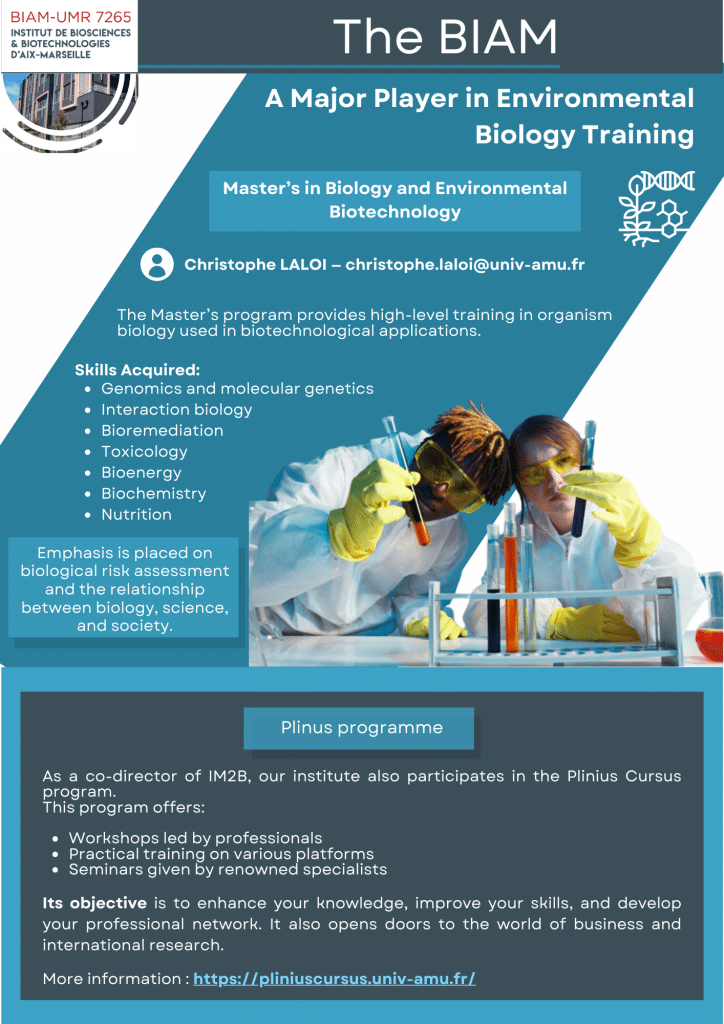You are here : Home City of energies > Home City of energies > Teaching training
Le BIAM
A Key Player in Environmental Biology Education
Our institute is deeply committed to the development and support of student training. In an enriching and stimulating environment, we welcome postgraduate students (Masters and Doctorates) as well as trainees at all levels, whether through traditional programs or sandwich courses. Our eight research teams provide opportunities for these students to engage in projects that tackle the pressing environmental challenges facing our society, allowing them to work alongside seasoned researchers and hone their technical and scientific skills.
Beyond the research teams, our management team actively includes work-study students in support roles, fostering their understanding of the organizational and strategic dimensions of running a research institute. These students have the chance to contribute meaningfully to projects across various fields, including financial management, human resources, communication, and project management.
We prioritize the creation of a collaborative and inclusive working atmosphere that promotes both personal and professional growth for our students and fixed-term staff. To this end, management supports the development of the Padawan Group, which unites students and temporary staff within the institute. This group encourages the exchange of knowledge and experience while providing professional support to leverage everyone’s skills. The Padawans also organize sports and cultural outings to facilitate the integration of newcomers and foster camaraderie among members.
“By joining our institute, our students gain personalized support and access to advanced resources and research tools.”
David Pignol, BIAM Director
Training in life and health sciences with AMU and BIAM
Plinius Cursus
As a director of the IM2B, our institute participates in the Plinius Cursus program. This training is aimed at PhD students, Master’s students, postdoctoral researchers, and research institute staff.
The program offers:
- Workshops led by professionals,
- Practical training on various advanced technological platforms
- Seminars delivered by renowned specialists
Its goal is to enhance your knowledge, improve your skills, and expand your professional network.
It also introduces you to the world of business and international research.
Doctoral School of Life and Health Sciences
All members of the UMR are attached to ED 658 Life Sciences. On average, 6 to 7 AMU theses are defended each year.
Pr. Ben Field, member of the Doctoral School Council
Offered at Aix-Marseille University, the Master’s program provides high-level training in organism biology, used in biotechnological applications. This course emphasizes biological risk assessment and the relationship between biology, science, and society.
Skills Acquired:
- Genomics and molecular genetics
- Interaction biology
- Bioremediation
- Toxicology
- Bioenergy
- Biochemistry
- Nutrition
Target Audience
The course is taught to small groups of students (maximum 20) selected based on their background and career goals. Careers include biotechnology and environmental engineering, plant improvement, regulatory bodies, or further study towards a PhD.
More information: Master in Plant Biology and Environmental Biotechnologies
Starting in September 2024, Mila Sirinelli-Kojadinovic, Associate Professor at AMU and member of the MEM team at BIAM, will coordinate the “Yellow Biotechnologies” course unit, offered within the “Microbial Engineering and Biotechnologies” track of the Microbiology Master’s program at AMU (Luminy).
The course will cover three main areas:
- Bioremediation
- Biosensors
- Bioenergies
These topics will be taught through lectures and practical sessions (article analysis) delivered by AMU researchers as well as researchers from our Biosciences and Biotechnology Institute of Aix-Marseille (V. Chapon, C. Berthomieu, P. Arnoux, C. Henry, Y. Beisson et F. Beisson).
The program covers General and Plant Biochemistry, Molecular Biology, Bioenergetics, Virology, Plant Genomics, Biotechnologies, Spectroscopy, Microscopy, and Imaging.
For more information on AMU programs, contact:
Christophe Laloi – christophe.laloi@univ-amu.fr
